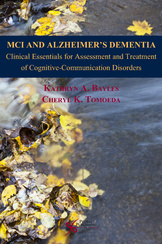Publication
MCI and Alzheimer's Dementia
Clinical Essentials for Assessment and Treatment of Cognitive-Communication Disorders
- Details:
- 232 pages, Color Illustrations (2 Color), Softcover, 6 x 9"
- ISBN13:
- 978-1-59756-518-9
- Release Date:
- 07/19/2013
Overview
MCI and Alzheimer's Dementia: Clinical Essentials for Assessment and Treatment of Cognitive-Communication Disorders succinctly presents critical information about the cognitive-communicative disorders associated with mild cognitive impairment (MCI) and Alzheimer's disease (AD). These are the profession's fastest-growing clinical populations: a new case of AD is diagnosed every seven seconds.
Notable features of this book include:
- A focus on Alzheimer's disease, the most common cause of dementia.
- Cutting-edge information about MCI, a very early stage of Alzheimer's disease, and the role of speech-language pathologists (SLPs) in early identification and behavioral and/or pharmacologic treatments.
- Clinical essentials--definitions, assessments, and treatments--for MCI and AD for students and practicing professionals.
MCI and Alzheimer's Dementia: Clinical Essentials for Assessment and Treatment of Cognitive-Communication Disorders was written by individuals dedicated to studying the cognitive-communication disorders of dementia and who have developed standardized tests used extensively by SLPs. It is a must-have for clinicians and students who work with patients with MCI or Alzheimer's disease and is the ideal choice for instructors who teach adult language disorders courses, particularly those that focus on cognitive-communication disorders of adults with dementia.
Review
Aine Lawlor, Speech and Language Therapist, HSE Community Adult Service, Dublin South West, Irish Association of Speech & Language Therapists Update Magazine (Spring/Summer 2014) (Spring/Summer 2014):
"It is a practical resource and the layout allows for dipping in and out to reference information or provide information to others...[MCI and Alzheimer's Dementia]helpfully relates intervention to assessment by discussing assessment results in sample cases and provided both long and short term goals based on the assessment results.
The book provides an overview of available cognitive intervention programmes and their associated research, outcomes and recommended intensity and duration. It relates the direct interventions to neural plasticity principals and the direct and indirect intervention chapters provide plenty of practical environmental strategies for intervening with this population (e.g., linguistic modification, reminiscence therapy). The indirect interventions described may also be useful in supporting education of staff and carers in settings such as Nursing Homes (i.e. benefits of maintaining social engagement, supporting orientation and benefits of nurturing)...
With the increasing prevalence of Dementia this book is a good go to summary guide to have available in the clinic."
Introduction
Definition and discussion of the dementia syndrome and its significance in terms of prevalence and cost.
MCI Defined
Explanation of MCI, its various forms, the recently revised diagnostic criteria established by the NIH and the Alzheimers Association, information about rate of conversion to AD, and a review of early changes in language and cognition.
Alzheimer's Dementia Defined
Diagnostic criteria, neuropathology, risk factors, effects on cognition and communication by stage of disease, and samples of the language of affected individuals by stage of disease.
Assessment of MCI and AD
The process of assessment, reviews of commonly used tests and severity measures, recommendations on tests for screening and comprehensive assessment, and differential diagnosis.
Rationale for intervention
Evidence from cognitive science for the involvement of SLPs in identifying individuals with MCI and AD and treating them directly and indirectly through caregiver counseling to sustain, improve, and/or maximize functioning.
Treatment of MCI
Options SLPs have for helping clients sustain function, including cognitive wellness programs.
Direct Treatment of AD
Treatment guidelines and evidence-based techniques for facilitating learning and information retrieval.
Indirect Treatment of AD
Modifications that SLPs can recommend and oversee regarding the physical and linguistic environment that will enable affected individuals to function at their highest level of ability. Specific recommendations are included about how to communicate with affected individuals and how to improve their ability to comprehend and express language.
About The Authors
Kathryn Bayles is an internationally known expert on the cognitive-communicative disorders of dementia. Now Professor-Emerita at the University of Arizona, Dr. Bayles has served as Department Head of Speech, Language and Hearing Sciences and Associate Director for the National Center for Neurogenic Communication Disorders. Her research has received support from the National Institutes on Aging, Mental Health, Deafness and Other Communication Disorders, the Alzheimers Association and the Robert Wood Johnson and Andrus Foundations. She is a Fellow in the American Speech-Language-Hearing Association and Honors recipient and a Past President of the Academy of Neurologic Communication Disorders and Sciences.
Ms. Tomoeda is Associate Director of Development for the University of Arizona College of Science after a 22-year career in the Department of Speech, Language, and Hearing Sciences. She is known for her work with Dr. Kathryn Bayles on the communication abilities of individuals with dementia. The two have collaborated on three other books, and co-authored two standardized tests for evaluating the cognitive-communication disorders of dementia, and conducted research on this topic for over 20 years.
Related Title
Here's How to Treat Dementia
Jennifer L. Loehr, Megan L. Malone
200 pages, Illustrated (B/W), Softcover, 8.5 x 11"










